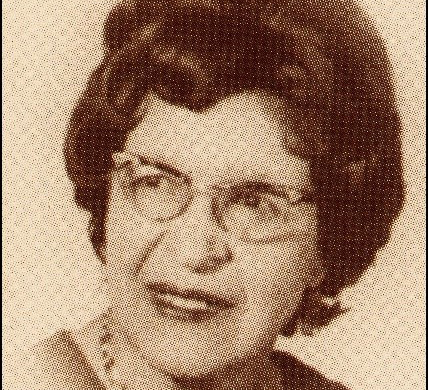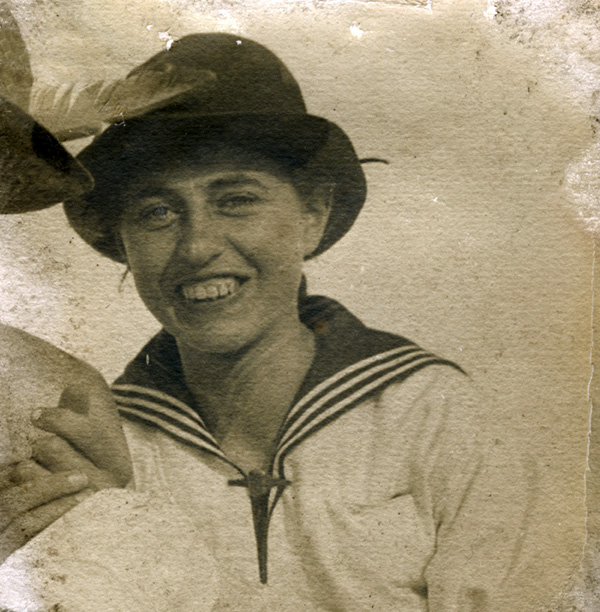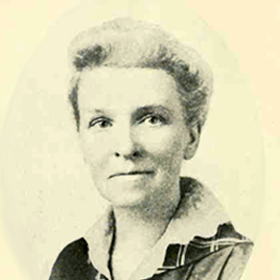Dartmouth residents learned kindness from Noelie Lemire Houle (1899-1993), the “Goat Lady of Dartmouth.” Noelie raised as many as 90 goats so that others could experience the benefits of goat’s milk. At first, neighbors complained about her farm, where goats roamed freely. Eventually, the community moved from intolerance to acceptance to celebration.
Lessons in simple kindness. These are what Dartmouth residents learned from Noelie Lemire Houle (1899-1993), the “Goat Lady of Dartmouth.” Born on a farm in Quebec, Canada, Noelie was the youngest of 10 children. In 1919, she immigrated to the United States to join an older sister and work in a corset factory in Massachusetts. Noelie married Almador Houle and the couple moved to his family’s 25-acre farm, which they eventually inherited, on the corner of Chase Road and Lucy Little Road in North Dartmouth. Noelie and Almador worked in a New Bedford electronics factory for many years.
Later in life when Noelie developed debilitating arthritis, a doctor recommended that she try drinking goat’s milk to alleviate her symptoms. Unable to work and barely walking, she bought her first goat and named her Girl. After drinking goat’s milk daily for about three months, Noelie felt better and was able to return to work. Grateful for her health, she began raising goats so that others could experience the benefits of goat’s milk. In the 1970s, she sold goat’s milk to St. Luke’s Hospital for newborns who could not nurse. The demand for goat’s milk increased, and over time Noelie owned as many as 90 goats. She named all of her goats and let them roam on the farm freely, from the barn to the yard to the inside of her farmhouse. Many of her goats won ribbons at county fairs. As more goat kids were born, Noelie donated them to Heifer Project International, a non-profit organization that provides people with livestock and training to move from poverty to self-reliance. Noelie also sold honey and eggs from her bees and chickens.
When she was forced to sell much of her surrounding land to pay her late husband’s medical bills, some of the new neighbors in pristine houses considered her farm a nuisance. These neighbors complained about the less than perfect yard, the weather-beaten farmhouse, and the unruly animals. Claiming that the animals were a public nuisance, they even reported her to town officials. Noises, smells and images coming from Noelie’s now small farm did not measure up to their expectations. She ignored her unhappy neighbors and kept to her simple life.
With time, as Noelie reached her eighties, a slow and steady shift from intolerance to compassion began to occur. “Meals on Wheels” drivers befriended Noelie, a school bus driver helped feed the goats between his runs, a church friend brought her groceries, and an amateur photographer spread out alfalfa bales and filled water troughs for the goats.
Artist Jane Bregoli moved to Dartmouth in 1988 to begin her master’s degree in painting at the University of Massachusetts Dartmouth. She became friends with Noelie, who agreed to be the subject for a series of 10 paintings. “The Goat Lady” paintings hung in the Dartmouth Town Hall for an art show, which was well attended by Noelie’s friends and neighbors. Her yard now seemed charming, her farmhouse looked quaint, and her animals were no longer considered a nuisance. Noelie received an award from the town of Dartmouth for providing its residents with fresh goat’s milk for such a long time. She even rode in a limousine at the head of the Fourth of July parade with Jane Bregoli and her children!
In 2004, Noelie Houle became known beyond Dartmouth with the publication of Jane Bregoli’s children’s book The Goat Lady, which tells the story of the relationship between Noelie and Jane’s family. Beautifully illustrated with over 20 paintings of Noelie and her goats, the book has been recognized for teaching compassion for others who seem different. Noelie’s story shows that simple kindness can move a community from intolerance to acceptance to celebration.
Ann O’Leary
Information from
- Barboza, Robert. “Remembering… The Goat Lady.” SouthCoast Today, 24 July 2013, https://www.southcoasttoday.com/article/20130724/PUB02/307240349.
- Bregoli, Jane. The Goat Lady. Tilbury House Publishers, 2004.
- Shelford, Chloe. “Artist Keeps the Memory of ‘The Goat Lady’ Alive.” Dartmouth Week, 17 Aug. 2018, https://dartmouth.theweektoday.com/article/artist-keeps-memory-goat-lady-alive/35620.
![[Noelie Houle], c. 20th century, Photograph, Courtesy of Milton Silvia / Spinner Collection Photograph of Noelie Houle - an old woman with a headscarft and sweater holding a baby goat](https://historicwomensouthcoast.org/wp-content/uploads/2019/10/Noelie-Houle-v2-506x506.jpg)




